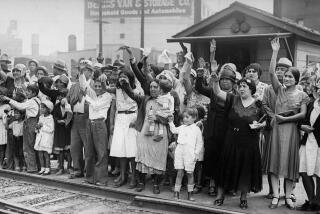Specter of Mariel Boat Lift Is Raised--14 Years Later
- Share via
WASHINGTON — It has been 14 years since 125,000 Cuban refugees flooded U.S. shores after President Fidel Castro permitted them to leave the port of Mariel in small boats in what one U.S. official called “population warfare.”
They came across the Florida Straits in droves, overwhelming resettlement agencies and refugee camps. Castro warned then, as he has done recently, that Washington’s policy of accepting Cuban immigrants while granting few visas encourages illegal efforts to leave his country.
Historians said that the flotilla was spurred by social unrest in Havana and the promise of economic opportunity in the United States. When Castro announced that he would permit Cubans who wanted to leave the country to sail for Florida from Mariel in April, 1980, hundreds chartered boats. Cuban Americans in Southern Florida used their own boats to help transport refugees.
Two weeks after Castro’s announcement, then-President Jimmy Carter said that the United States would “welcome the Cuban refugees with open arms and open hearts.” Carter later asked Castro to help regulate the influx of immigrants and instructed the Coast Guard to prevent further boat lifts on May 14.
The Coast Guard was spending nearly $700,000 a day to stem the flow of immigrants but its efforts largely failed because the sheer numbers of boats leaving Cuba overwhelmed them. Cutters seized more than 1,400 small craft but many more slipped through.
The exodus continued until September, when a Castro order ended it. By then Cuban immigrants had flooded the nation’s processing centers and begun staging hunger strikes to protest lengthy detention as they awaited resettlement.
An estimated 8,000 criminals and hundreds of mentally ill refugees--apparently released from Cuban institutions by Castro--were among the refugees who flooded into Florida and other states. About 1,100 of the refugees--some convicted of crimes in this country--still are held in federal prisons without the right to legal immigrant status.
But most of the refugees are now U.S. citizens, immigration experts said. Many settled in the Miami area.
“When the criminal activity surfaced, Marielito (a term for those who came to the United States in the exodus) became like a bad word,” said Juan Clark, a Miami sociologist. “Once the rotten apples were weeded out, the whole thing changed and today you don’t hear that word much any more.”
Miami Beach police officials reported that the city’s crime rate soared by 30% in the first three months of the flotilla.
Then-Arkansas Gov. Bill Clinton called out National Guardsmen in June 2, 1980, to deal with rioting by hundreds of Cuban refugees, who were held at Ft. Chafee, Ark.
Other Cuban criminals were held in a federal penitentiary in Atlanta, where they rioted and set fires in 1984, causing $1 million in damage.
More to Read
Sign up for Essential California
The most important California stories and recommendations in your inbox every morning.
You may occasionally receive promotional content from the Los Angeles Times.












